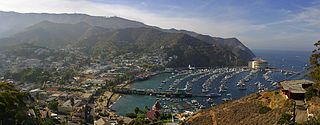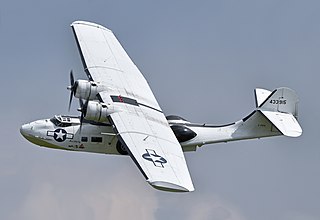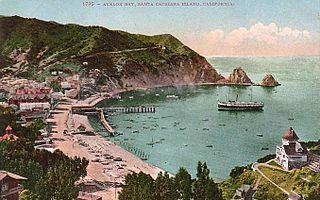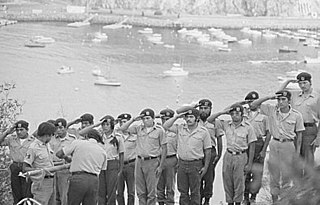Related Research Articles
Harry Norman Turtledove is an American author who is best known for his work in the genres of alternate history, historical fiction, fantasy, science fiction, and mystery fiction. He is a student of history and completed his PhD in Byzantine history. His dissertation was on the period AD 565–582. He lives in Southern California.

Avalon is the only incorporated city on Santa Catalina Island, in the California Channel Islands, and the southernmost city in Los Angeles County. The city is a resort community with the waterfront dominated by tourism-oriented businesses. The older parts of the town on the valley floor consist primarily of small houses and two and three-story buildings in various traditional architectural styles.
Catalina may refer to:
Wen Ho Lee or Li Wenho is a Taiwanese-American scientist who worked for the University of California at the Los Alamos National Laboratory in New Mexico. He created simulations of nuclear explosions for the purposes of scientific inquiry, as well as for improving the safety and reliability of the U.S. nuclear arsenal.

The Consolidated Model 28, more commonly known as the PBY Catalina, is a flying boat and amphibious aircraft that was produced in the 1930s and 1940s. In Canadian service it was known as the Canso. It was one of the most widely used seaplanes of World War II. Catalinas served with every branch of the United States Armed Forces and in the air forces and navies of many other nations. The last military PBYs served until the 1980s. As of 2021, 86 years after its first flight, the aircraft continues to fly as a waterbomber in aerial firefighting operations in some parts of the world. None remain in military service.

Golden West Airlines was a commuter airline that operated flights on a high volume schedule in California. It ceased operations in 1983.

Maria Full of Grace is a 2004 drama film written and directed by Joshua Marston. The film was produced between Colombia and the United States. The story follows a Colombian girl who becomes a drug mule for a trafficking ring. Lead actress Catalina Sandino Moreno was named Best Actress at the Berlin Film Festival, and was nominated for the Academy Award for Best Actress in the 77th Academy Awards.

Carlos Enrique Lehder Rivas is a German-Colombian former drug lord who was co-founder of the Medellín Cartel. He was released from prison in the United States after 33 years in 2020. Born in Armenia, Colombia, Lehder eventually ran a cocaine transport empire on Norman's Cay island, 210 miles (340 km) off the Florida coast in the central Bahamas.

American Empire: The Center Cannot Hold is the second book in the American Empire alternate history series by Harry Turtledove. It takes place during the period of the Roaring Twenties and the Great Depression. During this era in Turtledove's Southern Victory world, the Confederate States of America, stretching from Sonora to Virginia, is led by Whigs while the United States of America is controlled by Socialists.

Catalina Airport is a privately owned airport located 6.4 miles (10.2 km) northwest of the central business district of Avalon, California, United States, in the middle of Catalina Island. The airport is open to the public and allows general aviation aircraft to land there. The only requirement is that inbound pilots state their intention to land and that they pay a $35 landing fee. The airport is primarily used for general aviation. The airport is also used for airfreight from the mainland. Supplies for the island are delivered daily.

Birth tourism is the practice of traveling to another country or city for the purpose of giving birth in that country. The main reason for birth tourism is to obtain citizenship for the child in a country with birthright citizenship. Such a child is sometimes called an "anchor baby" if their citizenship is intended to help their parents obtain permanent residency in the country. Other reasons for birth tourism include access to public schooling, healthcare, sponsorship for the parents in the future, or even circumvention of China's two-child policy. Popular destinations include the United States and Canada. Another target for birth tourism is Hong Kong, where some mainland Chinese citizens travel to give birth to gain right of abode for their children.
There are bilateral treaties that govern aviation rights between the United States and China, which cover both passenger services and cargo services. The United States has liberal aviation agreements with many countries but not China, South Africa, and some South American countries. However, there is no "open skies" agreement between China and the US, which generally refers to an agreement that allows unrestricted flights between countries. The current US-China treaty specifies the number of flights permitted. Due to the highly regulated nature of awards for route authority between the two countries and the strict limits on number of flights, the application process is competitive. US airlines have sought to gain support from local politicians and the general public to influence the US government into awarding routes.

The Boxer Indemnity Scholarship Program was a scholarship program for Chinese students to be educated in the United States, funded by the Boxer Indemnity. In 1908, the U.S. Congress passed a bill to return to China the excess of Boxer Indemnity, amounting to over 17 million dollars. Despite the fierce controversies over returning the excess payment, President Theodore Roosevelt's administration decided to establish the Boxer Indemnity Scholarship Program to educate Chinese. President Roosevelt recognized this program as a chance for "American-directed reform in China" that could potentially improve US-China relations, bridging Chinese and American culture, and promoting the US's international image. Instead of copying European imperialism and using military means to reap a short-term financial gain, Roosevelt established the program to insure peace and trade in China in the "most satisfactory and subtle of all ways", while helping the United States gain respect and take a leadership position in the world.

The Sinaloa Cartel, also known as the CDS, the Guzmán-Zambada Organization, the Pacific Cartel, the Federation and the Blood Alliance, is a large, international organized crime syndicate that specializes in illegal drug trafficking and money laundering. It was established in Mexico during the late 1980s as one of a various number of subordinate "plazas" operating under a predecessor organization known as the Guadalajara Cartel. It is currently headed by Ismael Zambada García and is based in the city of Culiacán, Sinaloa, with operations in many world regions but primarily in the Mexican states of Sinaloa, Baja California, Durango, Sonora, and Chihuahua. and presence in a number of other regions in Latin America as well as in cities across the U.S. The United States Intelligence Community generally considers the Sinaloa Cartel to be the largest and most powerful drug trafficking organization in the world, making it perhaps even more influential and capable than Pablo Escobar's infamous Medellín Cartel of Colombia was during its prime. According to the National Drug Intelligence Center and other sources within the U.S. the Sinaloa Cartel is primarily involved in the distribution of cocaine, heroin, methamphetamine, fentanyl, cannabis and MDMA.

The Valley-Westside War is a 2008 American young adult alternate history novel by Harry Turtledove. It is the sixth and final book in the Crosstime Traffic series.

Santa Catalina Island is a rocky island off the coast of Southern California in the Gulf of Santa Catalina. The island is 22 mi (35 km) long and 8 mi (13 km) across at its greatest width. The island is located about 29 mi (47 km) south-southwest of Long Beach, California. The highest point on the island is Mount Orizaba. Geologically, Santa Catalina is part of the Channel Islands of California archipelago and is the easternmost of the Channel Islands. Politically, Catalina Island is part of Los Angeles County in District 4. Most of the land on the island is unincorporated and is thus governed by the county.

The history of human activity on Santa Catalina Island, California begins with the Native Americans who called the island Pimugna or Pimu and referred to themselves as Pimugnans or Pimuvit. The first Europeans to arrive on Catalina claimed it for the Spanish Empire. Over the years, territorial claims to the island transferred to Mexico and then to the United States. During this time, the island was sporadically used for smuggling, otter hunting, and gold-digging. Catalina was successfully developed into a tourist destination by chewing gum magnate William Wrigley, Jr. beginning in the 1920s, with most of the activity centered around the only incorporated city of Avalon, California. Since the 1970s, most of the island has been administered by the Catalina Island Conservancy.

Vice is a 2018 American biographical political satire black comedy-drama film directed, written, and co-produced by Adam McKay and starring Christian Bale as former U.S. Vice President Dick Cheney, with Amy Adams, Steve Carell, Sam Rockwell, Justin Kirk, Tyler Perry, Alison Pill, Lily Rabe, and Jesse Plemons in supporting roles. The film follows Cheney on his path to becoming the most powerful vice president in American history. It is the second theatrical film to depict the presidency of George W. Bush, following Oliver Stone's W. (2008).

The Occupation of Catalina Island began on August 30, 1972, when the Brown Berets, a Chicano-rights organization, occupied Catalina Island, off the coast of Los Angeles, for three weeks. The Berets, led by their "Prime Minister" David Sanchez, claimed the territory rightfully belonged to Mexico and demanded that its 42,000 acres of undeveloped land be developed into housing.
References
- ↑ "Steven H. Silver.com: Harry Turtledove short stories". www.stevenhsilver.com.